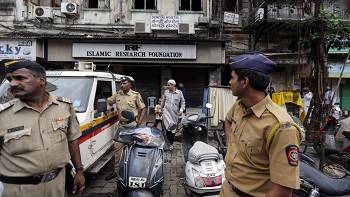He has 16 million followers on Facebook, 150,000 on Twitter and has given more than 4,000 lectures on Islam across the world. But Zakir Abdul Karim Naik, the popular Islamic preacher, is now wanted by the Indian authorities.
Problems arose for the preacher last summer, after Bangladeshi authorities said that one of the gunmen responsible for an attack on a cafe in the Bangladeshi capital, Dhaka, which left 22 people dead, ‘had been inspired by him’.
Bangladesh responded by banning Peace TV, an Islamic channel broadcast from Dubai which Naik founded in 2006 and which is said to reach 100 million people worldwide.
The 51-year-old preacher denied supporting violence, releasing a video statement in which he said: "Killing innocent beings is the second major sin in Islam."
But in November, India's counterterrorism agency, the National Investigation Agency (NIA), filed a First Information Report, an official police complaint, against Naik and the Mumbai-based non-profit Islamic Research Foundation (IRF) that he founded in 1991, accusing him of ‘indulging in unlawful activities and promoting religious hatred’.
The Hindu nationalist government of Prime Minister Narendra Modi responded by imposing a five-year ban on the IRF under the country's anti-terror laws.
'Illegal, unjustified, unwarranted'
Naik's lawyer, Mubeen Solkar, told Al Jazeera that he will "challenge the ban before an appropriate court".
"We have got sufficient grounds to show that the ban was not only illegal but also unjustified and unwarranted," he added.
India's Enforcement Directorate, which investigates economic crimes, has accused the IRF of ‘money laundering’ and closed its properties in Mumbai. An educational trust run by Naik has also been prevented from receiving funds from abroad.
Solkar denies that his client has been involved in money laundering. "All the transactions were done through banks and all the funds came through legal channels," he said.
"There is nothing to show that any of the amounts would constitute proceeds of crime, which is a requirement under the PML Act [Prevention of Money Laundering Act]."
Naik has not returned to India since last July.
His whereabouts are currently not known, although he has in recent months given interviews and conducted a press conference via Skype from Saudi Arabia, which has bestowed on him one of the country's highest awards for "service to Islam".
He has offered to be questioned via video-conferencing, but the Indian authorities have refused, and earlier this month approached Interpol, the International Police Organization, seeking his arrest and return to India.
Naik considers this to be part of a broader Indian government agenda.
In September, before the charges were filed and the ban imposed, Naik wrote an open letter in which he said: "This is not just an attack on me, it's an attack against Indian Muslims. And it's an attack against peace, democracy and justice."
In a subsequent open letter after the charges and ban, he wrote: "IRF and I were set up for a ban .... It is now proven that the decision to ban IRF was taken months ago and it was a communal decision. Before investigations were done, even before reports [were] submitted, the ban was already decided ... Whether it was owing to my religion or some other reason does not matter. What matters now is that my work of 25 years - completely lawful work - has been banned. And that is the most unfortunate thing for this country."
'Hounded by the media'
His view is shared by many within India's Muslim community, members of which have come under attack from far-right Hindu groups associated with Modi's ruling Bharatiya Janata Party (BJP).
Kashif-ul-Huda is the editor of news website TwoCircles.net, which focuses on Muslim issues in India. He feels Naik has been targeted because he is a Muslim.
"He never preached violence. His lectures were always open and recordings freely available," he said.
"If such a person can be hounded by the Indian media without a shred of evidence, you can imagine what happens to lesser mortals who get arrested on trumped-up charges," he added, alluding to a number of cases where Muslims have been jailed on ‘terror’ charges only later to be found innocent.
Solkar, Naik's lawyer, stressed that his client had not committed any offence under the anti-terror UAPA law.
Six months after the police complaint was filed, Solkar said "no charge-sheet has been filed so far before the NIA court".
The Indian authorities have previously accused Naik of influencing young people in southern Kerala state to join ISIS. But Naik has denied these charges and has criticized ISIS, referring to it as the "anti-Islamic state".
PHOTO CAPTION
Mumbai Police personnel outside the closed office of the Islamic Research Foundation [EPA]
Source: Aljazeera.com


 Home
Home Discover Islam
Discover Islam Quran Recitations
Quran Recitations Lectures
Lectures
 Fatwa
Fatwa Articles
Articles Fiqh
Fiqh E-Books
E-Books Boys & Girls
Boys & Girls  Ramadan
Ramadan Fatwa Audios
Fatwa Audios Month of Mercy
Month of Mercy Women
Women Eed Al- Fitr
Eed Al- Fitr Food Recipes
Food Recipes Videos
Videos

 Prayer Times
Prayer Times












